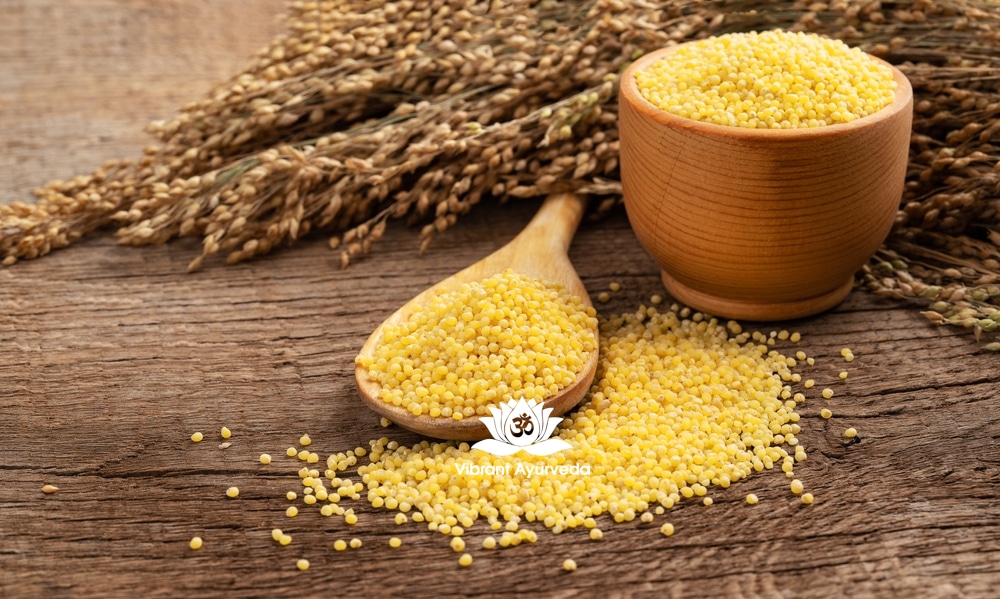In this article, we will explore the importance of millets in Ayurvedic nutrition, their nutritional value, health benefits, and how they can be incorporated into our daily diet.
Ayurveda, an ancient Indian science of medicine, emphasizes the importance of a balanced diet for maintaining good health. Millet, a group of small-seeded grasses, has been an important part of traditional diets in many parts of the world for centuries. In Ayurveda, millets are considered to be one of the most important grains for human nutrition. Millets are packed with nutrients and are easy to digest, making them an excellent choice for people with digestive problems or those who are looking for a healthier alternative to refined grains.
What are Millets? Millets are a group of small-seeded grasses that have been grown and consumed by humans for thousands of years. Millets are gluten-free, highly nutritious, and have a low glycemic index, making them an excellent choice for people with diabetes or those who are trying to manage their blood sugar levels.
There are several types of millets, including:
- Finger millet (Ragi)
- Foxtail millet (Kangni)
- Pearl millet (Bajra)
- Barnyard millet (Jhangora)
- Kodo millet (Kodon)
- Little millet (Kutki)
- Proso millet (Cheena)
Nutritional Value of Millets Millets are a rich source of nutrients such as carbohydrates, proteins, dietary fiber, vitamins, and minerals. They are also a good source of antioxidants and phytochemical, which have several health benefits.
Here is a breakdown of the nutritional value of millets
Carbohydrates Millets are a good source of complex carbohydrates, which provide energy to the body. Unlike refined grains, which are stripped of their fibre and nutrients, millets are packed with fiber, which slows down the absorption of carbohydrates, keeping you fuller for longer and preventing spikes in blood sugar levels.
Proteins Millets are a good source of plant-based protein, making them an excellent choice for vegetarians and vegans. Finger millet is particularly rich in protein, containing up to 7.3% protein.
Dietary Fiber Millets are rich in dietary fiber, which is essential for maintaining a healthy digestive system. Fiber helps to regulate bowel movements, prevent constipation, and promote the growth of healthy gut bacteria.
Vitamins Millets are a good source of several vitamins, including vitamin B1, B2, B3, and B6. These vitamins are essential for maintaining healthy skin, hair, eyes, and liver.
Minerals Millets are a rich source of minerals such as iron, magnesium, phosphorus, and potassium. These minerals are essential for maintaining healthy bones, teeth, and muscles, and for regulating blood pressure and fluid balance in the body.
Health Benefits of Millets
Millets have several health benefits, which make them an important part of Ayurvedic nutrition.
Here are some of the key health benefits of millets:
- Lowers Cholesterol: Millets are rich in dietary fiber, which helps to lower cholesterol levels in the body. The fiber in millets binds with cholesterol in the gut, preventing its absorption into the bloodstream.
- Controls Blood Sugar Levels: Millets have a low glycemic index, which means that they are digested slowly and do not cause a rapid spike in blood sugar levels. This makes them an excellent choice for people with diabetes or those who are trying to manage their blood sugar levels.
- Prevents Anemia: Millets are a good source of iron, which is essential for the production of haemoglobin in the body.
In conclusion, the nutritional and healing benefits of millets make them a valuable addition to any Ayurvedic diet. To incorporate millets into your diet, it’s best to consult with an Ayurvedic expert who can guide you through the process of choosing the right millets, cooking them in the correct manner, and incorporating them into your daily meals. So, let’s take the first step towards a healthier lifestyle by seeking the guidance of an expert and embracing the goodness of millets in our daily diet. Consult an Ayurvedic expert today to learn more about the millet diet and how it can improve your overall health and well-being.


